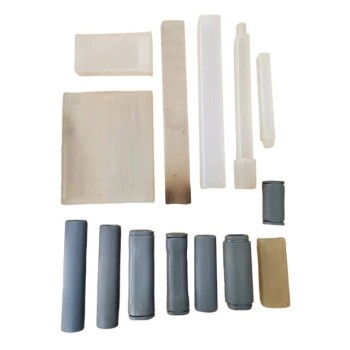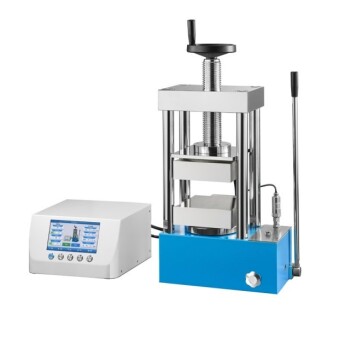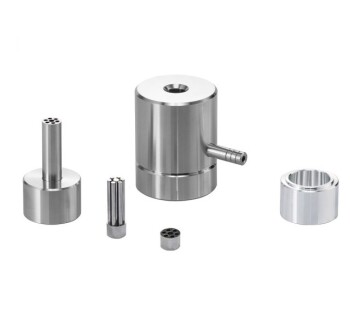At its core, Warm Isostatic Pressing (WIP) enables space exploration by fabricating components with the exceptional integrity required to survive the harsh environment beyond Earth. This specialized manufacturing process produces highly uniform, defect-free parts from powdered materials, ensuring they can withstand the extreme temperatures, vacuum, and vibrational stresses of launch and operation in space.
The primary challenge in aerospace is eliminating material imperfections, as even microscopic flaws can lead to catastrophic failure under stress. Warm Isostatic Pressing solves this by using a heated fluid to apply uniform pressure, consolidating powdered materials into solid components with virtually no internal defects or density variations.

Understanding Warm Isostatic Pressing
Warm Isostatic Pressing is a material processing technique that sits between its cold and hot counterparts. It leverages both pressure and moderate heat to form solid objects from powders.
The Principle of Uniform Pressure
The term "isostatic" means that pressure is applied equally from all directions. This is the fundamental principle that ensures the final component is uniformly dense.
Unlike mechanical pressing, which applies force from one or two directions, isostatic pressing immerses the material in a fluid, guaranteeing that every surface is compressed with the same force simultaneously.
The Role of Moderate Heat
WIP distinguishes itself from Cold Isostatic Pressing (CIP) by heating the liquid medium (typically water or oil) to temperatures usually below 300°C.
This added thermal energy improves the consolidation of the powder particles. More importantly, it helps in the removal of trapped gases and impurities, leading to a much higher quality and more reliable final product.
The Mechanics Behind a Flawless Component
The unique advantages of WIP come from its specific mechanical setup, which is designed for precision and uniformity.
The Flexible Mold (Envelope Die)
The powdered material is first placed into a sealed, flexible mold or "envelope die." This flexible jacket is crucial for the process.
When submerged in the heated fluid, the mold collapses uniformly around the powder, perfectly transmitting the isostatic pressure. This ensures the part compresses evenly, preventing the density variations and internal stress points that plague other methods.
The Booster Source and Heated Medium
A booster source is used to inject the heated liquid medium into the sealed pressing chamber.
This system maintains the precise pressure and flow rate required for the process. It ensures the mold is filled efficiently and that both heat and pressure are applied consistently throughout the consolidation cycle.
Why WIP is Critical for Space Exploration
For aerospace applications, where failure is not an option, the benefits of WIP directly translate to mission safety and success. Components made via this method are essential for everything from engine parts to structural elements.
Achieving Unmatched Uniformity
The uniform pressure application results in a component with extremely consistent density. This means the material's properties—such as strength and thermal resistance—are predictable and reliable throughout the entire part.
Eliminating Internal Defects
The combination of heat and pressure effectively purges trapped air and other contaminants from the powder mass. This process eliminates microscopic voids that could otherwise become crack initiation sites under the immense stress of a rocket launch or orbital temperature swings.
Precision for Demanding Industries
This technology is not limited to aerospace. Its ability to produce durable, precise, and defect-free components makes it vital for other high-stakes fields, including the manufacturing of advanced medical devices and high-performance automotive parts.
Understanding the Trade-offs
Choosing a manufacturing process involves balancing capability against complexity and cost. WIP occupies a strategic position in this landscape.
WIP vs. Cold Isostatic Pressing (CIP)
CIP is simpler and generally less expensive, but it produces a less-dense "green" part that requires significant secondary processing (like sintering) to achieve final strength. WIP produces a much higher-quality part out of the press, reducing defects from the start.
WIP vs. Hot Isostatic Pressing (HIP)
HIP uses far higher temperatures and pressures to create fully dense, net-shape parts directly from powder. However, it is a significantly more complex and expensive process. WIP provides an intermediate step for materials that benefit from heat but do not require full sintering temperatures during pressing.
Cost and Complexity
The addition of a heating system and a high-pressure liquid booster makes WIP inherently more complex and costly than a cold pressing system. The investment is justified by the superior quality and reduced defect rate of the output components.
Making the Right Choice for Your Application
Selecting the correct isostatic pressing method depends entirely on the material requirements and economic constraints of your project.
- If your primary focus is creating a basic, pre-sintered part at low cost: Cold Isostatic Pressing (CIP) is often the most practical choice.
- If your primary focus is achieving high uniformity and removing impurities without full sintering: Warm Isostatic Pressing (WIP) provides the ideal balance of quality and process efficiency.
- If your primary focus is producing a fully dense, mission-critical component from high-performance alloys: Hot Isostatic Pressing (HIP) is the required technology, despite its higher cost.
By understanding this balance, you can select the precise manufacturing process to ensure component integrity, whether for orbit or for Earth-bound applications.
Summary Table:
| Key Aspect | Contribution to Space Exploration |
|---|---|
| Uniform Density | Ensures consistent strength and thermal resistance in components |
| Defect Elimination | Removes microscopic voids to prevent failures under stress |
| Process Efficiency | Balances quality with cost for aerospace manufacturing |
Need reliable lab press machines for your aerospace projects? KINTEK specializes in automatic lab presses, isostatic presses, and heated lab presses to help you achieve superior component integrity. Contact us today to discuss how our solutions can enhance your laboratory's capabilities and ensure mission-critical success!
Visual Guide

Related Products
- Lab Isostatic Pressing Molds for Isostatic Molding
- 24T 30T 60T Heated Hydraulic Lab Press Machine with Hot Plates for Laboratory
- Automatic High Temperature Heated Hydraulic Press Machine with Heated Plates for Lab
- Automatic Heated Hydraulic Press Machine with Hot Plates for Laboratory
- Laboratory Manual Heated Hydraulic Press Machine with Hot Plates
People Also Ask
- Why are flexible silicone rubber molds required for the Cold Isostatic Pressing (CIP) of salt preforms? | KINTEK
- What role do rubber molds play in Cold Isostatic Pressing? Expert Insights into CIP Laboratory Material Formation
- Why is the selection of a flexible rubber mold critical in the Cold Isostatic Pressing (CIP) process? | Expert Guide
- Why are flexible molds essential for the compaction of TiMgSr powders? Achieve Uniform Density in Cold Isostatic Pressing
- What is the purpose of specialized flexible rubber molds in CIP for PiG? Achieve High-Purity Isotropic Compression



















